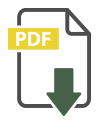
Case Study
Context
Atlas Community Primary a one form entry primary school with 194 children on roll from Nursery – Year 6. It is situated in the Bradford West area of the city within the Manningham ward. The school is in an area of high deprivation with 93.5% of the school cohort living in the 30% most deprived areas of England. Based on the Index of Multiple Deprivation (IMD), the school is ranked 8th out of 160 primary schools. 32% of the school cohort is eligible for Free School Meals and 33% of the school cohort is eligible for Pupil Premium. The three main ethnicity groups that attend the school are Other Pakistani (67%), Bangladeshi (6.5%) and Mirpuri Pakistani (9.5%). 90% of the school cohort speaks English as an additional language. 25% of the school cohort has SEN Support. The needs of the children at Atlas are at the forefront of everything we do. The teaching team work closely with the SENCO to ensure that we are meeting the needs of all learners. Our curriculum is built with the whole child being central and the school has a big focus on our personal development offer. The SIP for this academic year has identified that we would like to have a focus on target children for achieving GDS. Therefore, that will be something that will be considered when selecting our focus pupils.
At Atlas reading is an integral part of our daily routines as quoted on our school website Reading is fundamental to learning. At Atlas, we promote a love of books and of reading. We have built our curriculum with a strong emphasis on reading and have a wonderful library in the heart of the school. This was recognised on our last Ofsted visit who reported “Pupils enjoy reading books from the newly developed library. They talk enthusiastically about their favourite authors”. We acknowledge that we need to work hard to embed a true love of reading and that we have many external contributing factors which affect the opportunities around reading for our children. Our website also offers a bank of story time videos for the children to access at home.
We signed up to the reading for pleasure project along with other schools in our multi-academy trust. Raising the profile of reading is a key priority and the whole staff team are ready to fully engage with the project.
Explore
Staff Surveys: We began by asking all members of staff to complete the OU teachers review of practice survey to give us a clear baseline. There was a response from 16 members of staff. This included all members of teaching staff, the Headteacher and six members of support staff. Learning walks focusing on reading are carried out half termly along with pupil voice. The pupil voice was varied around reading for pleasure. Some children appeared to see reading as a task rather than something they achieved a real pleasure. However, some children showed a real love of reading and talked very positively about their experiences. The library is well used by all year groups. It was clear we needed to understand more about our children as readers.
The survey results identified:
Many staff lack knowledge on up-to-date children’s literature. Staff do want to further develop their knowledge.
46 % of staff reported that they are rarely seen reading for pleasure by the children in their class. It is vital that we provide the children with reading role models as this is something that very few of the children at Atlas have at home.
Staff often re-call texts and authors from their own experiences as learners.

We also had some staff discussions around reading and the prior experiences that staff have around reading. Many of the support staff at Atlas reported that they did not have books at home when growing up and therefore connect experiences around books to learning. This lack of their own experience of reading for pleasure leaves them lacking the understanding and knowledge to effectively support the children. This has provided us with an insight into cultural differences that we were not fully aware of before.
Strengths:
Staff, in particular teaching staff, appear to be very self-aware and driven to improve their own knowledge.
All staff attended the training and were enthusiastic on driving forward with improvements.
Staff chose focus children through careful consideration and were able to talk about the children they had selected with a great deal of knowledge.
The library is a well-used resource in school.
Area’s for development:
To ensure that support staff are empowered and supported by teaching staff to further develop their knowledge on children’s literature.
To ensure that there is consistency through school around opportunities for children to take part in reading for pleasure.
To ensure that we are providing all children with reading role models.
Pupil Surveys: Children also completed OU reading for pleasure surveys.
Children in year 2 upwards completed the survey on an individual basis. Children in EYFS and Year 1 completed the survey in small groups with an adult – this was more discussion focused with the highlights recorded.
The surveys showed:
Children often recall celebrity authors.
The opportunities for independent reading for pleasure vary throughout school.
Children report that most of their reading takes place in school with few children reporting reading at home.
Many children enjoy reading, this is clear in pupil voice and from the responses to the questionnaires.
As a school we have discussed that pupil voice provides a clearer insight into children’s views on reading. The children seem to try and answer a survey in a way to try and impress the person carrying out the survey and as a result they are not always honest with their responses. This becomes apparent when comparing results with asking the same questions in an open discussion. Therefore, we must use pupil voice as a measure alongside the survey responses.
Strengths:
Children enjoy reading and use the school library well.
Many children talk positively about reading to adults.
Staff are developing their own subject knowledge and keen to support children with their reading choices.
Areas for development:
Develop strategies through school to ensure that the book choices are learner led (for example through book votes).
Ensure that staff can support children effectively in their book choices.
Ensure that there is a consistent protected time for reading for pleasure throughout school.
Encourage peer to peer book talk.
Prepare
Aim 1: Develop staff subject knowledge of children’s texts
Aim from action plan:
To display clearly books that classes are reading to encourage book talk throughout the whole of the school environment
The aim outlined on the action plan is intended to support the following:
- Support staff developing knowledge around children’s texts.
- Book talk/recommendations between staff and children – moving on to peer to peer.
Research suggests that many educators focus on reading instruction and reading for pleasure is seen as an afterthought. However, reading for pleasure is reading in its own right and therefore should be seen this way by educators. Children should have opportunity to read in a sociable and meaningful way for them and adults need to understand their readers in a way to facilitate this (T.Cremin, M.Mottram, F.M.Collins, S.Powell and K.Safford, 2014).
We aim to generate a culture throughout school that goes beyond the classroom. Having books displayed is a visual way to prompt discussions around books outside of the classroom. It will offer up opportunities for adults to open discussions and will then provide the opportunity for these discussions to be peer to peer.
Aim 2: To develop independent reading for pleasure
Aims from action plan:
To track the reading habits of the focus children to understand more about the types of texts that they choose
Implement protected time in the timetable for all year groups
Daily – read aloud by teacher
2/3 x per week independent reading time with the teacher also taking part
Focus children were chosen by staff teams during the whole school training day. Staff were asked to consider our whole school focus on raising attainment – in particular thinking of children who we can target for greater depth. It was reported by A Hempel-Jorgensen et al (2018), that having reading for pleasure engrained in practice that it leads to raised attainment in literacy and numeracy. They were asked to choose one child who was targeted for greater depth in reading. The rationale was that by gaining a deeper insight into the reading habits of these children, staff would be able to support them to develop their reading for pleasure. There is a wealth of research that links this with academic attainment. All staff were provided with a list of focus children and asked to note their reading preferences and observations made around reading. Below is outlined the starting point for each focus child and reason for selection.
| Year group | Reading habits | Reason for selection |
| Nursery | Male – uninterested by books | To understand more about reading preferences |
| Female – will enjoy a book with an adult but not interested in exploring books with peers | To understand more about reading preferences | |
| Reception | Male – Skilled reader but rarely chooses to explore books and can become disinterested at story time | To understand reading preferences and help to develop a love of reading |
| Male – Skilled reader but rarely chooses to explore books and can become disinterested at story time | To understand reading preferences and help to develop a love of reading | |
| Year 1 | Male – reluctant reader, can but reports not enjoying reading | Targeted for GDS Has skill – would like to develop will |
| Female – can read, makes very safe choices | Has skill – want to develop will | |
| Year 2 | Female – has skill but not will. Enjoys being read to but rarely chooses to read independently. | Develop will |
| Male – has skill but not will. Enjoys being read to but rarely chooses to read independently. Struggles to express preference. | Develop will and gain an insight into preferences when reading. | |
| Year 3 | Female – loves reading and will go for similar book choices | GD target child. Want to understand her more as a reader and help to widen her reading choices. |
| Female – reading habits have changed and she seems to be disinterested in reading | Want to help her re-discover her love of reading and her enjoyment levels to improve. | |
| Year 4 | Male – Rarely reads a whole book. Doesn’t seek out a challenge with reading choices. | GD target child. To understand more about reading preferences and support to improve engagement. |
| Female – Choosing books that are beyond reading ability and as a result struggling to engage and comprehend. | Has a love for reading. Needs more support with choices to ensure its a more meaningful experience. | |
| Year 5 | Female – Has skill and will but tends to stick to very similar books | GD target child. Would like to understand her better as a reader and support her to widen her reading |
| Male – Reports not liking reading and always goes for the same books | Would like to tune into interests and help to develop a love of reading | |
| Year 6 | Female – reads a wide range of books | GD target child. Would like to understand her more as a reader and help to develop her as a peer supporter for more reluctant readers. |
| Male – reports to not enjoy reading | Would like to understand his reading habits more and try to support him with his choices to try and develop a love of reading |
Independent reading is reported to be central to reader development (Gambrel, 2011). By carefully selecting focus children in each year group this will give staff an opportunity to really focus their attention on their reading habits. This is an opportunity to learn more about them as readers. This will be used as a model that will then be further developed to focus on the reading habits of children at Atlas.
In addition to this the opportunity to further develop independent reading time in school will allow for adults to model and support children in developing good reading habits. As outlined previously, we are aware that children rarely have a reading role model at home. The intention is that by developing good independent reading skills in school they can then continue to develop this at home. They will understand reading to be a sociable time and may share their love of reading with their families. It is outlined that children need a strong reading role model, this helps to develop strong reading relationships in the environment (T.Cremin, M.Mottram, F.M.Collins, S.Powell and K.Safford, 2014)
Change team
The change team consists of one member of staff from each phase in school (EYFS, KS1 and KS2).
This will allow for practical suggestions and strategies to be shared that are suitable for children at every stage of their journey at Atlas. As a small school the staff have opportunity for interactions with all children in their phase. This allows us to be proactive and reactive with the implementation of the actions outlined in the action plan.
Deliver
Intention: implementing your development plan and ongoing documentation of impact
| Aim 1 – | Strategies implemented |
| Develop staff subject knowledge of children’s texts |
|
1 and 4 above are the strategies which have had the biggest impact to date.

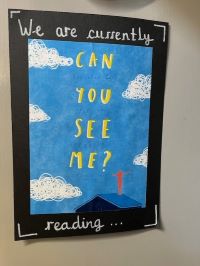
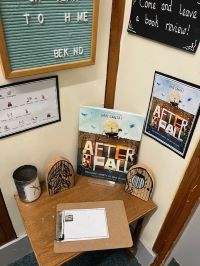
All classroom doors now have books they are reading/have enjoyed. This has had an impact on book talk and has seen children to be intrigued and enthusiastic when talking about books they have shared with their class. Children have also taken opportunities to leave post it reviews on the books.
Children have requested new books and when the books have arrived, they are creating their own waiting lists for the books. They have also compared them to other books they have read which has led to more requests as they have found a style that they enjoy.
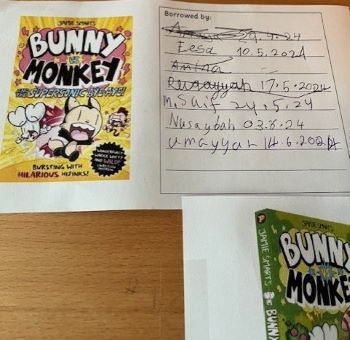
| Aim 2 – | Strategies implemented |
| To develop independent reading for pleasure | Implement protected time in the timetable for all year groups
|
2, 3 and 4 above are the strategies which have had the biggest impact to date.
Independent reading for pleasure is now well established throughout school. Techers join in with this time and report that it has generated lots of rich discussion around reading. During learning walks, it has been great to see the children’s reading habits develop and change over time. Some groups are very sociable during this time, taking part in shared reading and having lots of discussion. Whilst some children use the time as a quiet time to get lost in their book. A year 2 child was recently spotted in the cloakroom at break time. When asked why he wasn’t outside he replied, “I just need to finish the next part of the book”.
Pupil voice has been overwhelmingly positive with many children reflecting upon the changes in their reading habits. All children report that they enjoy seeing their teachers reading and discussing it with them. The slide below illustrates the journey for one of the focus children in year 1.

We did some staff CPD focused on independent reading for pleasure. Part of the training involved completing a self audit on our current practice in each year group and creating an action plan. This helped to ensure that all staff were well informed in their approach and using high quality research to inform their practice.
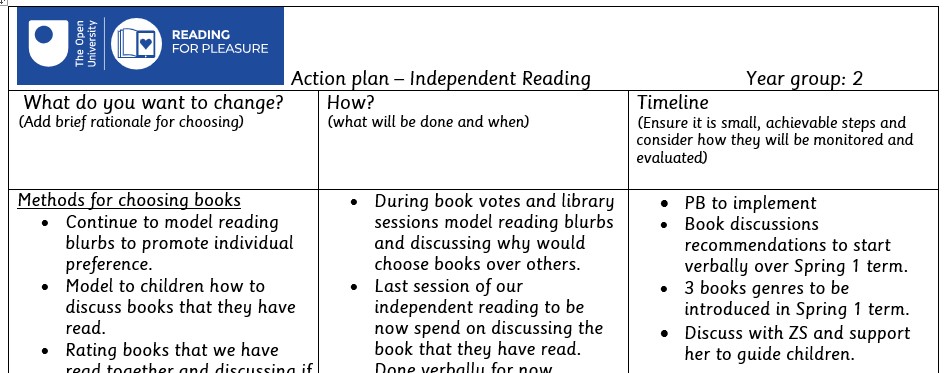
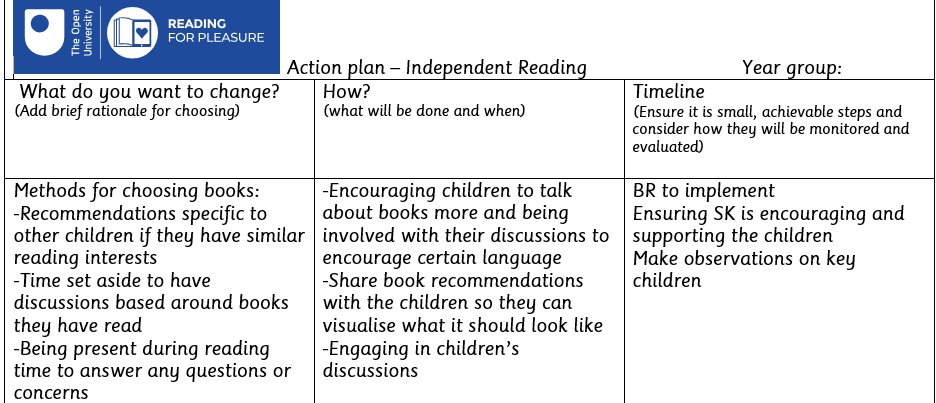
Review
Throughout the year the change team has taken opportunities to pause and reflect upon how the project is going. In addition to this there has been half termly pupil voice with the focus children. There have been discussions around pupil progress and attainment with class teachers. Learning walks and wider pupil voice have also provided good evidence relating to the success of the project. We conducted staff and children surveys at the start of the project and in summer 1. The evidence of all have been considered as outlined below.
Staff headlines:
Through staff CPD and regular discussions the impact of the project on teaching staff is overwhelmingly positive. Teachers report that children in their class have improved in confidence and that changes implemented have allowed for lots more book talk. This has allowed the teachers to better understand the children as readers.
Aim 1.
Throughout the course of the year, we have carried out some staff CPD focused around selecting high quality texts. The end of year surveys show that staff have reviewed their class libraries to ensure that they have a broad range of texts on offer.
Start
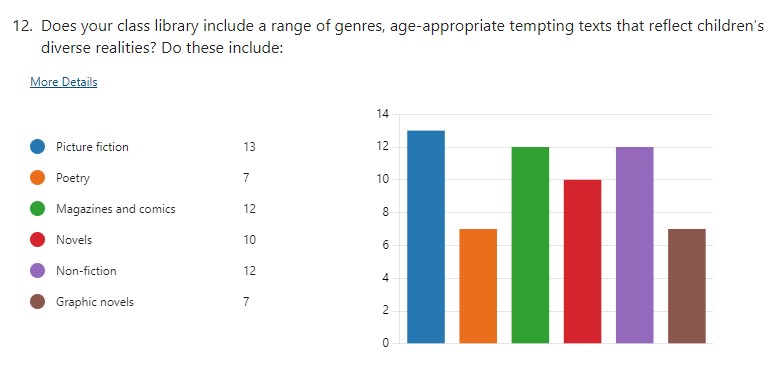
End
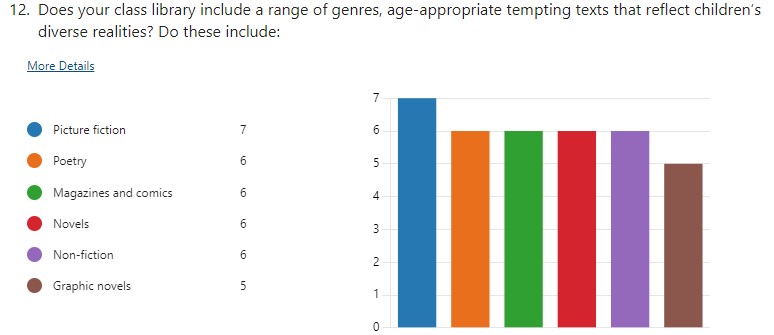
In addition to this, discussions with staff have highlighted that they are using the Rfp website to inform their choices of texts. This is reflected through engagement levels of the children. Discussions around text choice have led to children requesting specific texts. The changes that staff have made have given opportunity for more book talk, and this has had a positive impact on both the children and staff.
Aim 2.
Early in the programme we completed some staff CPD focusing around auditing our current practice in relation to independent reading for pleasure. This formed a great baseline and starting point for each class. Throughout the course of the year there has been regular drop ins and pupil voice carried out. The pupil voice has been incredibly powerful in illustrating the changes. Children have become increasingly passionate about their own reading journeys. They have also started to notice the reading journeys of others. In the spring term as some new books were due into school (as requested by the children in year 3), I discovered they had begun their own waiting lists for specific texts. They were also observed to be recommending texts to each other.
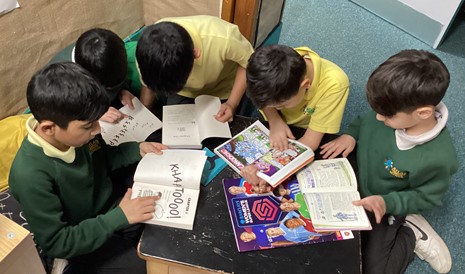
Teachers report that the changes they have made to the independent reading for pleasure time have had an overwhelmingly positive impact. They feel that they know their children well as readers and that the overall quality of this time has improved. In addition to this, the children are passionate about this time and many classes are choosing additional library visits as part of enrichment time in school. This is highlighted in the staff survey:

Teachers report that the changes they have made to the independent reading for pleasure time have had an overwhelmingly positive impact. They feel that they know their children well as readers and that the overall quality of this time has improved. In addition to this, the children are passionate about this time and many classes are choosing additional library visits as part of enrichment time in school. This is highlighted in the staff survey:
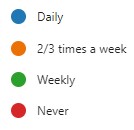
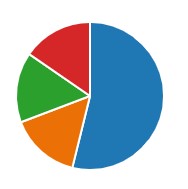


Start
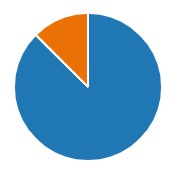
End
Pupil Headlines
Engagement levels in reading have improved overall, throughout school. There is a renewed enthusiasm, this is now moving outside of the classroom and into more social aspects of the school routine.
The most notable changes are the requests for books. There has been an increase of children enjoying a particular genre and then researching other similar titles to add to our school library. Children are snatching time throughout the school day to continue onto the next part of their book, and we have even had children going home and buying their own copies of books they have enjoyed. This was reflected in the pupil surveys which showed a decrease in “I’m OK at reading” and an increase in “I love reading“.
Close monitoring of the focus children has shown a positive impact on academic progress. Over 50% of the group have made more than expected progress with their reading. In addition to this it was reported by 88% of staff that changes in reading habits have had a positive impact on attainment.
Pupil voice has taken place half termly with the focus children. The children have shown increasing confidence, passion and enthusiasm during the pupil voice. This can be summarised with the powerful comment from one of the focus children when asked about the change in her reading throughout the year.
“I used to not like reading and it was hard but now I can’t wait to finish my book and start the next one”
Year 6 focus child
Sustain
This year has taken our small teaching team on a journey. We began the year in a strong position, with a strong reading ethos in place. This has provided a solid foundation that we have built upon throughout the year. One of the most valuable elements was the opportunity to set protected time aside for staff CPD around the pedagogies which support reading. Although we selected two areas to focus on, we feel that our growing knowledge around reading for pleasure have allowed us to develop beyond the two main aims. The importance of developing knowledge around pedagogy and developing a strong reading for pleasure culture is highlighted by Cremin et al (2018). This is supported with evidence that reading for pleasure has a positive impact on academic attainment (Sullivan and Brown, 2013).
The most significant change for the team has been the shift in independent reading for pleasure. This is evident in all year groups and offers us a strong reading culture to continue to grow and develop. Teachers have gained the understanding of the true value of independent reading for pleasure. It has shifted from a quiet, routine, time filling part of the day to a social time with rich discussion and high levels of engagement from all. This important shift in culture is defined by Cremin et al (2014), to be a crucial part of the reading for pleasure journey.
The positive changes that we have developed over the year will be at the forefront of our plans as we move forward. The work with the focus group of children has allowed for a valuable insight into the impact that reading for pleasure has. This will be used to inform our action plan as we move into the sustain phase of our journey.
We have evaluated our action plan for the year which has allowed for us to see which areas have had the most impact. It has also highlighted an area for further development. Relating to aim 1 – our teaching staff have grown their knowledge around children’s texts throughout the year. However, we would like to develop this with support staff. We will explore ways to do this with the change team. In addition to this we need to ensure any new staff have access to relevant CPD to support them to be a part of our reading community in school.
Our key priorities for next year will be…
- Continue to develop class libraries
- Ongoing CPD for staff
- Continue to empower support staff to drive forward our Rfp journey.
- Embark on a trust wide sustaining programme with the reading working group
- Further develop parental engagement
Our journey has just begun, and we are excited to see where it takes us.


